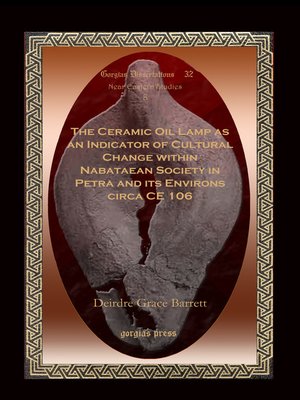The Ceramic Oil Lamp as an Indicator of Cultural Change within Nabataean Society in Petra and its Environs circa CE 106
ebook ∣ Gorgias Studies in Classical and Late Antiquity
By Deirdre Grace Barrett

Sign up to save your library
With an OverDrive account, you can save your favorite libraries for at-a-glance information about availability. Find out more about OverDrive accounts.
Find this title in Libby, the library reading app by OverDrive.



Search for a digital library with this title
Title found at these libraries:
| Library Name | Distance |
|---|---|
| Loading... |
How did the Nabataeans view their world at the time of the Roman annexation in CE 106? If it is possible to detect an altered perception after their monarchy was dissolved at that time, how can we be sure it was authentic and not a veneer, masking the identity of a disaffected people? One approach is to consider religious practice as a diagnostic for identity within Nabataean society. Religious practice is examined through the ceramic oil lamp, a ubiquitous vessel that can portray socio-political and religious symbolism and cultural hybridization.







